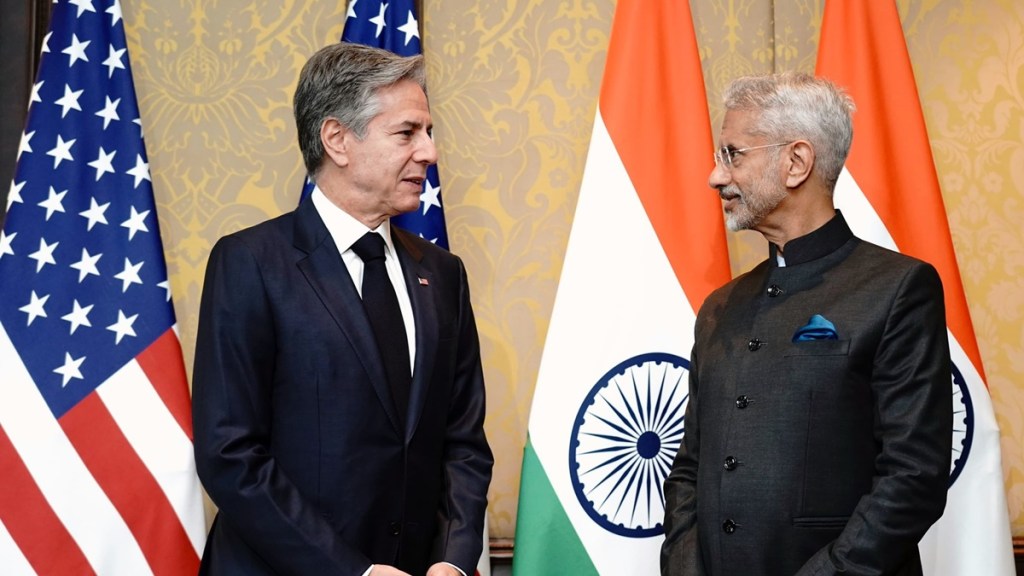India and the United States underscored the imperative of a two-state resolution to navigate the complex Israel-Palestinian crisis during the fifth edition of 2+2 India-US Ministerial Dialogue in New Delhi. The two sides examined the problems of the October 7 Hamas attack on Israel.
Notably absent from the joint statement was any explicit mention of a ceasefire. Instead, the diplomatic dialogue advocated for “humanitarian pauses” as a nuanced approach to the ongoing conflict in the Gaza Strip.
The joint statement issued at the end talks highlighted the shared stance of India and the US against terrorism, specifically referencing the horrific terrorist attacks on Israel. Both sides urged strict adherence to international humanitarian law, particularly in safeguarding civilians. And it called for the “immediate release” of individuals still held hostage in the Gaza Strip, reflecting a joint commitment to addressing the humanitarian toll of the conflict.
Position on the ongoing Israel-Hamas War
Responding to a question at a special briefing, Foreign Secretary Vinay Mohan Kwatra elaborated on India’s perspective, introducing the proposal for a “two-state solution and early resumption of dialogue” as a strategic pathway to tackle the crisis. According to him this proposal signals India’s diplomatic commitment to fostering a sustainable and inclusive resolution to the longstanding Israel-Palestinian issue.
The term “humanitarian pauses,” as reiterated in the joint statement, echoed the recent diplomatic engagements of US Secretary of State Antony Blinken, who had talked about this concept during a meeting with Arab Foreign Ministers in Amman on November 4. During this interaction, the US stayed away from endorsing a ceasefire in Gaza, opting instead for facilitating humanitarian relief.
The 2+2 ministerial meeting, was co-led by India’s External Affairs Minister S. Jaishankar and Defence Minister Rajnath Singh, along with their US counterparts, Secretary of State Antony Blinken and Secretary of Defence Lloyd Austin. The agenda extended beyond the Israel-Palestinian crisis to encompass a spectrum of global issues.
India-Canada
The relationship between the two countries had strained in September when Canadian Prime Minister Justin Trudeau implicated Indian agents in the June 18 murder of Khalistan Tiger Force leader Hardeep Singh Nijjar. The US had previously expressed support for Canada, particularly after India expelled 41 Canadian diplomats in a move framed as a response to diplomatic parity.
The ministers engaged in a comprehensive discussion on the evolving situation, highlighting India’s core security concerns. A significant aspect of this discourse involved the recent threat emanating from Gurpatwant Singh Pannun, spokesperson for Sikhs for Justice, who urged people to avoid flying Air India after November 19, hinting at possible sabotage. “We have core security concerns and I am sure you are all aware of recent video that has surfaced from one such individual,” Kwatra said, laying out India’s position on the row with Canada during the special press meet.
The joint meeting also provided a platform for US officials, Blinken and Austin, to meet with Prime Minister Narendra Modi. During this interaction, Prime Minister Modi underscored the foundation of the India-US partnership on shared beliefs in democracy, pluralism, and the rule of law. He said that this partnership served as a formidable force for global good, reinforcing the significance of the strategic alliance between the two nations.
Bangladesh Elections
Another topic of discussion at the ‘2+2’ meeting was the upcoming election in Bangladesh. US officials had recently made statements regarding this electoral event, which prompted questions during the joint press conference. Foreign Secretary Kwatra reiterated India’s longstanding policy of non-interference in the internal affairs of other nations. He stated that the election in Bangladesh is an internal matter, affirming India’s respect for the democratic process and its commitment to supporting Bangladesh’s vision of stability, peace, and progress.
This firm expression of India’s position comes at a critical juncture, just days before the announcement of elections in Bangladesh. It serves as a testament to the enduring India-Bangladesh partnership under the leadership of Prime Minister Sheikh Hasina.

